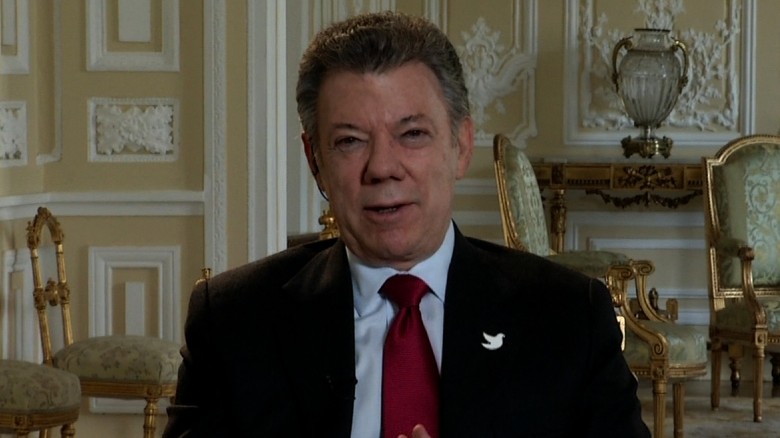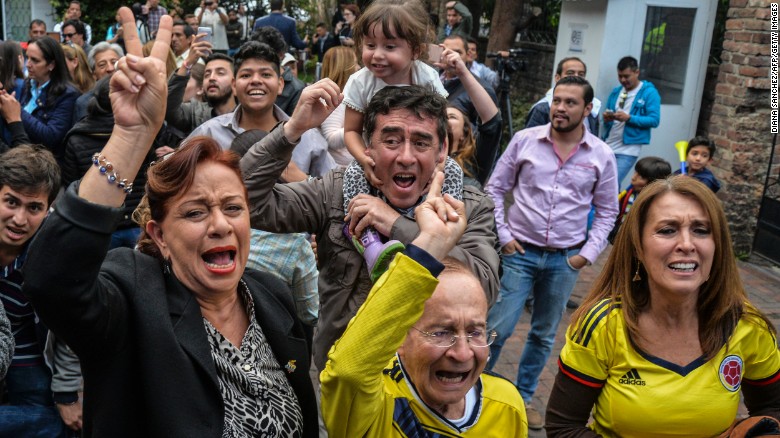Colombians narrowly reject peace deal with the FARC
Colombians narrowly rejected a referendum on Sunday on a peace deal that took over four years to negotiate and would have ended five decades of war.
In a final result few were anticipating, 50.22% of voters voted "no" on the single-issue ballot, a blow to President Juan Manuel Santos, whose popularity has suffered in his support of the deal.
FARC rebels, also known as the Revolutionary Armed Forces of Colombia, released a statement expressing sadness at the vote.
"With today's result, we know that our goal as a political movement is even more grand and strong. The FARC maintains the will of peace and reiterates its disposition to only use words as a weapon for constructing the future," the statement said.
No 'Plan B'
Just last week, in a scene generations of Colombians never dreamed of seeing, President Santos and FARC leader Rodrigo Londoño used pens made of recycled bullets to sign a deal ending a 52-year-old war.
But now it seems the rebels and the Colombian government, facilitated by international leaders, will have to go back to the drawing board to reimagine a peace that is acceptable to victims of murder, extortion and kidnapping.
It is largely unclear what the path forward looks like, as rebel fighters were supposed to give up their weapons and rejoin society. Santos, who has said before there is no "plan B" if the deal fails, said a ceasefire will remain in place and negotiations will continue in Havana, Cuba.
In Colombia, a decades-long fight comes to an end
Just over 50% say no
The results of the referendum on the elections website show that 99.91% of the polls are in and 50.22% of voters have voted "no," a total of 6,430,708 votes. Heavy rains from Hurricane Matthew dissuaded voters in coastal areas from showing up at the polls. The referendum needed at least 13% turnout to hold.
Opinion polls had suggested the measure would pass, despite criticism that it didn't do enough to punish the rebels. For many Colombians, the possibility of peace requires compromise and forgiveness for the estimated 220,000 lives lost.
In a televised address to the nation, Santos said he will continue to fight for peace and urged Colombians to not let the results undermine the country's stability. "We all want peace," he said.
"I summoned you all to see if you supported the ending of the conflict with FARC, and the majority -- even for a reduced margin -- said no."
"I hear those that said 'no' and those that said 'yes' and we all want peace. Tomorrow we will get all our political parties together to continue dialogues and finding alternatives for peace. I will not give up, I will continue to fight for peace."
The FARC expressed hope after the results were announced, tweeting, "The love that we carry in our heart is huge and with our words and actions will be able to achieve peace." The group's leader, better known as Timochenko, said from Havana, "To the Colombian people that dream of peace, you can count on us."
Forgiveness without justice?
For Salud Hernandez, a correspondent for El Mundo newspaper who was kidnapped by Colombia's second largest rebel group, the ELN, in May, the accord is not justifiable for the Colombian people.
"I don't think this is fair in any sense of what justice means," she said.
"The tragedies of the war, the tears of the people, the missing, that the people, the families live. It is like they are the walking dead," she said of a "stupid" war that has "planted much more tragedy than misery."
Critics feel that the deal isn't hard enough on FARC fighters and worry they will receive no jail time for crimes.
READ: FARC soldiers worry about life after peace
Although the peace deal has overwhelming international support, former president Alvaro Uribe Velez has been leading the campaign against it. He argues that the deal offers impunity to FARC fighters and accuses his successor, Santos, of conceding to FARC demands.

Colombia President: Peace deal is 'most comprehensive'
"There are victims and there are people who want revenge and people who cannot forgive the horrible results of a civil war," said Jennie K. Lincoln, director of the Americas Program at The Carter Center. "That is what this peace accord is asking Colombians to do -- to forgive, not forget, but forgive and move forward."
"That is the difficult element for Colombian society -- how to move forward after 50 years of civil war, and a peace accord which doesn't punish everyone that people might like to see be punished," Lincoln said.
READ: Colombia's FARC rebels release child soldiers
The hundreds of pages of the treaty outlined a 180-day window to implement the peace process after the referendum passes.
"There is euphoria that the peace accord is being signed. Then there is the expectation that there will also be hard work," said Lincoln, who sees the accord as a "road map." "The next step will be as difficult or more difficult than getting to this accord."
News Courtesy: www.cnn.com











